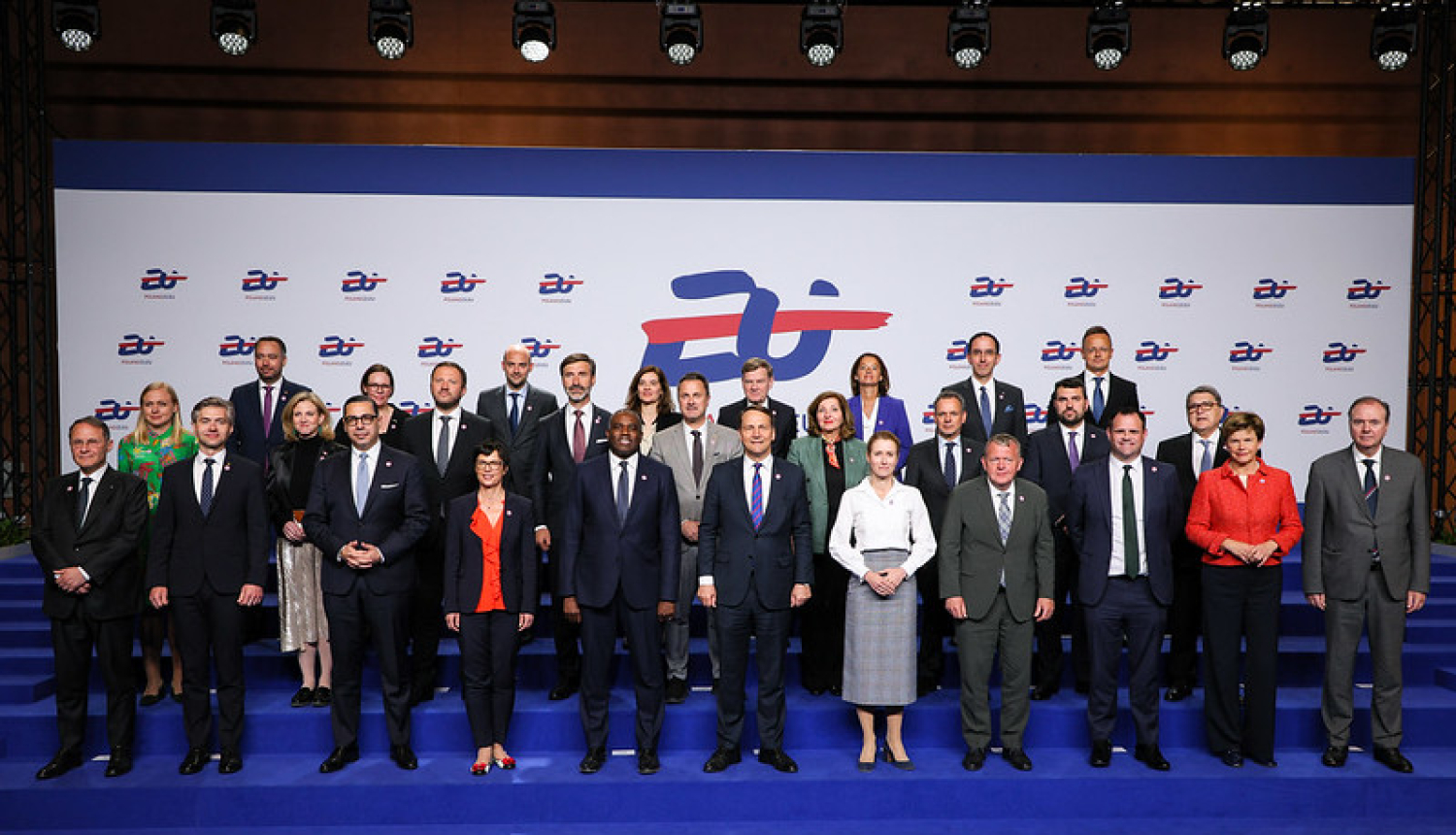Further support for Ukraine and economic pressure on Russia and its supporters, including the 17th package of EU sanctions against Russia and the EU’s plan for full energy independence from Russia, strengthening Europe’s security and defence capabilities, dialogue with the United States on its presence in Ukraine and security guarantees – those were key issues discussed at the informal meeting of EU foreign ministers, or Gymnich. The meeting was hosted by the Polish Presidency of the Council of the EU on 7–8 May in Warsaw, Poland.
The Minister of Foreign Affairs, Baiba Braže: “We meet with EU foreign ministers on a historic date – on 8 May, when we pay tribute to all the victims of World War II. Meanwhile, Russia is “repeating history” by shelling Ukrainian cities day after day, for the fourth year, and killing civilians. Today, Putin’s regime is using the defeat of Nazism to justify its military aggression and atrocities against Ukraine and its people. Russia is also “twisting history” and deliberately ignoring the fact that the Molotov-Ribbentrop Pact, its secret protocols and the invasion of Poland by Nazi Germany and the USSR paved the way for the horrors of World War II in Europe. Crimes of communism perpetrated by the USSR during and after World War II, by occupying the Baltic states, have still not been condemned in the same way as the crimes of Nazism have been.”
Right now, Russia is the only obstacle to the end of the war and to peace. There is a need to increase economic pressure on Russia, and our priority is crystal clear: the EU must achieve full energy independence from Russia, from its oil, gas, nuclear fuel, mineral fertilisers, and any other goods that continue to bring revenue to Russia’s budget and feed the war. We welcome the European Commission’s proposals to make Europe completely independent of Russia’s energy resources,” Baiba Braže pointed out.
The Minister also underlined that “Europe and the allies must continue all forms of support to Ukraine, including by speeding up the process of Ukraine’s accession to the EU, so that accession negotiations can be launched as early as this year”.
During the Gymnich meeting, the ministers met with the Foreign Secretary of the United Kingdom of Great Britain and Northern Ireland, David Lammy. “The UK has been a reliable ally from day one of the war in our joint fight against Russia’s full-scale war of aggression against Ukraine. We very much appreciate Britain’s support for Ukraine, including dialogue with the U.S. on security guarantees for Ukraine and sanctions on Russia – Latvia is working with the UK on sanctions coordination matters, especially in the fight against Russia’s “shadow fleet”. Latvia together with the UK is leading a drones coalition in support of Ukraine – 18 countries have joined the coalition so far,” said Baiba Braže.
So far, the EU has imposed sanctions against 153 “shadow fleet” vessels, the United Kingdom, against 150, and the U.S., against more than 220 vessels.
Foreign ministers thanked the UK, France, and Germany for their leadership in organizing discussions to achieve a just and lasting peace in Ukraine with serious security guarantees, and to contain Russia. Ministers expressed their hope that an agreement on closer security and defence cooperation would be signed at the EU-UK summit on 19 May.
In a discussion on relations between the EU and the U.S., the ministers agreed that Europe should take the lead in ensuring its own security and defence while maintaining a close transatlantic link. Cooperation with the strategic ally in the areas of mutual concern at both national and EU level should also be further developed.
Ministers then exchanged views on the situation in the Middle East and Sudan, as well as the escalation between India and Pakistan.
By tradition, the foreign affairs ministers of potential candidates – Albania, Bosnia and Herzegovina, Montenegro, North Macedonia, Moldova, Serbia, Türkiye, Ukraine, and Kosovo – also participated in the Gymnich meeting.
At the Warsaw Security Forum, Foreign Minister Baiba Braže spoke at a high-level discussion on Europe’s response to Russian threats: “Russia will continue to carry out unconventional attacks, put to test the response capabilities of the EU and NATO allies, look for weak spots, and draw new red lines. Russia is the most serious threat to Euro-Atlantic security. Allies must act resolutely and in a coordinated manner to strengthen their security and defence capabilities while continuing work on the overall containment of Russia. NATO has responded promptly to attacks on critical undersea infrastructure by launching a Baltic Sea surveillance mission, “Baltic Sentry”. It is essential that new EU instruments for rapid response do not create new bureaucratic red tape and are dovetailed with NATO plans.”






